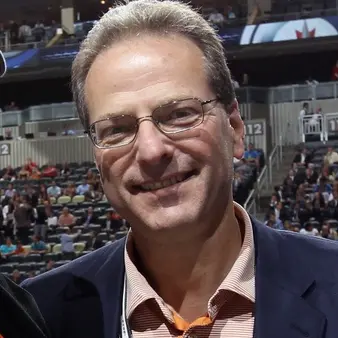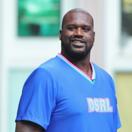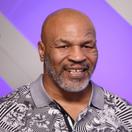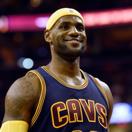At first glance, Henry Nicholas III comes across as a very typical, mild-mannered internet gazillionaire. He earned a $10 billion net worth as the co-founder of technology firm Broadcom. He is very religious and has donated tens of millions of dollars to various charities. He is the founder of an organization called Justice for Homicide Victims, Inc., a non-profit that supports the families of murder victims, which he launched in honor of his late sister who was murdered by a college ex-boyfriend.
Based on these qualities, Henry certainly seems like an upstanding man of high moral value, right? Certainly not a man who at one point in his life allegedly used his $10 billion net worth to build built a secret sex lair under his house to host wild orgies. Certainly not a man who once faced charges of prostitution, distribution of cocaine, and meth. Certainly not a man who, allegedly, once smoked so much weed on his private jet that the pilot was forced to wear an oxygen mask to avoid getting a contact high. And definitely not a man who was arrested by Las Vegas police in 2018 after police found MDMA, Meth, cocaine, heroin AND an unconscious woman in hit hotel room. Who exactly is this Henry Nicholas character?
Early Life
Henry Nicholas was born in Cincinnati in 1959. His father, Henry Nicholas Jr., was an attorney for the IRS who struggled with alcoholism. Henry's parents divorced when he was four years old. After the divorce, Henry and his sister Marsalee moved with their mother to Santa Monica, California. His mother remarried in 1967. Henry's stepfather was a screenwriter named Robert Leach. Henry, who has gone by "Nick" since he was young, graduated from Santa Monica High School and went on to the United States Air Force Academy. He dropped out after three years when it became clear that at 6'6″ tall, he would never be a fighter pilot. So he enrolled at UCLA and eventually earned a B.S. in 1982, M.S. in 1985, and Ph.D. in 1998, all in electrical engineering.
While Nicholas was in graduate school at UCLA in 1983, his family suffered a tragic loss. His sister Marsalee, who was a 21-year-old senior at UC Santa Barbara, was murdered by an ex-boyfriend. The family was devastated. Henry and Marsalee's step-father would go on to become a leading figure in California's victim's rights movement.
After finishing school, Henry Nicholas went to work at the defense contractor TRW. There, he met his future Broadcom partner Henry Samueli. He also met a fellow electrical engineer named Stacey Feller. They quickly started dating and were married in 1987. Around this same time, the two Henrys began consulting part-time for a start-up company called PairGain Technologies.

(Photo by Kevork Djansezian)
Broadcom
In 1991, Nicholas and Samueli founded Broadcom in the spare bedroom of Nicholas' Redondo Beach condominium. They each invested $5,000 of their own money to get the business off the ground. Nicholas was the C.E.O., and Samueli served as the chief technologist.
Broadcom would eventually make computer chips that enable voice, video, data, and multimedia to travel at very high speeds. Their chips were revolutionary in building high-speed Internet, Wi-Fi, and Bluetooth technology.
Nicholas and Samueli took their company public on April 17, 1998, right smack dab in the middle of the original dotcom frenzy. Broadcom stood out from the other dot-coms of the day because, unlike a lot of the other dotcoms at the time, their company was actually profitable on the day it went public. The company was one of the fastest companies in history to achieve $1 billion in annual revenue.
On IPO day, Broadcom's stock debuted at $4 a share and, over the course of the first day of trading, more than doubled. When the final bell was rung that day, Nicholas and Samueli were each worth more than $600 million. It was one of the hottest public offerings in history. Six months later, both Henry Nicholas and Henry Samueli were billionaires.
By August 2000, Broadcom's stock was at $182.42 per share. At this price, Broadcom's market cap topped $60 billion. The average Broadcom employee was worth $6 million. The company's parking lot was filled with Porches, Ferraris, Lamborghinis, and other expensive luxury cars. The two Henrys were each worth $10 billion. After decades of ups and downs, they are both back to being worth exactly $10 billion today.
The Underground Lair
As a result of their respective windfalls, Nicholas and his wife, Stacey began to spend lots of money. Or, rather, Nicholas did. Despite her newfound wealth, Stacey still preferred her more modest minivan and shopping trips to Target over the luxury vehicles her husband seemed to acquire by the dozen. Nicholas also bought an aviation company called Prestige Air that gave him access to three private jets and a helicopter.
At some point, Henry and his wife began to renovate their house. They lived in the Nellie Gail Ranch area of Laguna Hills – one of the most luxurious developments in the area. The Nellie Gail Ranch features 20 miles of equestrian trails, and homes that are 5,000 square feet are considered small. Just a week after Broadcom's I.P.O., Nicholas and his wife bought a much larger home a few doors down Rodeo Circle from their current home for $1.7 million. They immediately kicked off a renovation project that was initially intended to cost $400,000 but ultimately cost $30 million by the time the home was complete.
Henry Nicholas was not content to sit back and enjoy the well-deserved quiet home life of an internet billionaire. On the contrary, as a matter of fact. Nicholas had a plan that would allow him to indulge in what he considered the finer things in life. While his wife settled in the main area of their property, Henry set out to build the ultimate (hedonistic) man cave.
Henry's dream man cave was an underground lair that would be built below the family's hillside home. Nicholas had contractors create a tunnel leading down to a series of rooms between the house's gym and library that would eventually connect to a 2,000-square-foot personal sports bar that was to be called Nick's Café.
In the library, a panel opened toward the passageway. The tunnel had faux stone walls with impressions of skulls carved into niches lit by candelabras. The underground lair had several entrances and exits – there was a staircase in the sports bar that lifted up, an entrance covered by a rock close to the wine cellar, and an exit onto a horse trail that was disguised as a supply shed. The lair was filled with every amenity for decadence you can imagine. Twelve-foot high ceilings, columns covered in 24-carat gold leaf, top-of-the-line sound equipment, and a Jacuzzi were all contained in the rooms that brought to mind someone's harem fantasy gone overboard.
The ongoing construction made Nicholas' neighbors impatient, and they soon began to complain – especially when they were confronted by Henry's armed guards on the horse trail. Neighbors called city officials in Laguna Hills , who discovered that there was no permit for any of the construction. The city officials shut Nicholas down immediately.
Here is a photo of the house taken from a helicopter in September 2000, right around the time the neighbors' complaints caught the media's attention:
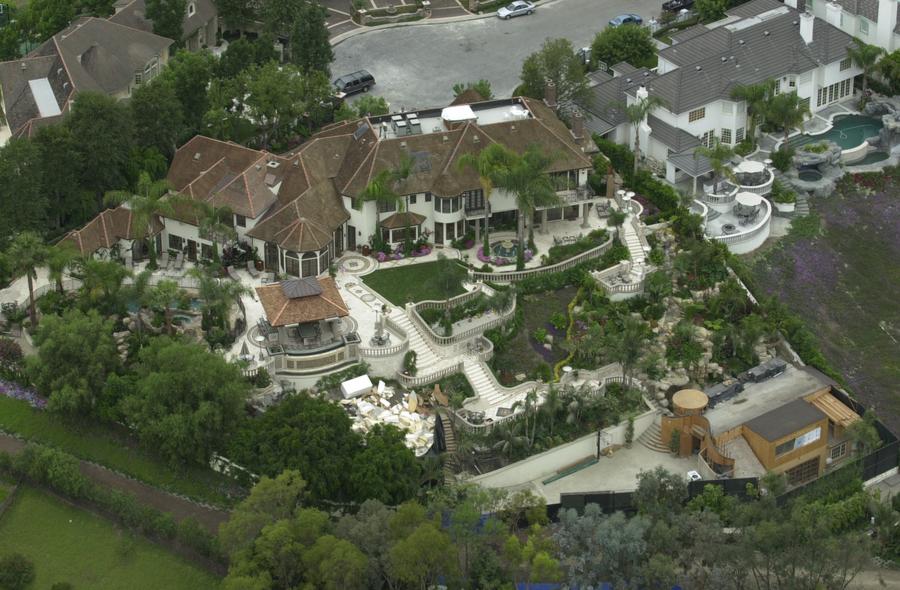
(Photo by Don Kelsen/Los Angeles Times via Getty Images)
The Warehouse
Nicholas was too addicted to the idea of having his own secret lair to let it go, so he bought a warehouse in a gritty industrial district five minutes from his home. He basically just shifted all the contractors from his house to the warehouse, where they were instructed to build a replica of the lair.
The warehouse lair was soon given the name "The Ponderosa" or "The Pond," as regulars came to call it. Visitors entered through a secret passageway that opened up to a large room decorated in red and gold. Nicholas liked the Pond so much that he began to host wild parties there. According to government prosecutors, it was at these parties where Henry supplied drugs like cocaine, ecstasy, and marijuana to his guests. Prostitutes were an abundant mainstay at the Pond. Henry reportedly treated the Pond as his own personal brothel.
Unfortunately, the good times did not roll forever. In May 2002, Henry's wife, Stacey, drove over to The Pond and allegedly caught Nicholas red-handed cheating on her with a prostitute. Henry was also reportedly sky-high on drugs at the time.
Stacey immediately filed for divorce. The battle between the former spouses took more than seven years to finalize.
Nicholas stepped down as CEO of Broadcom in 2003, ostensibly to work on his marriage and family life.
Former employees alleged that Nicholas used drugs and prostitutes to get an advantage in business. A former event planner for Broadcom testified that he saw Nicholas put "powdered ecstasy pills into the drinks of his customers." A Broadcom engineer also stated in a lawsuit that Nicholas had "a practice of hiring prostitutes to greet customers, business associates, and for himself." Reportedly, Nicholas even gave these prostitutes titles at Broadcom. He called them professional saleswomen.
Away from all the sex, drugs, and parties, Broadcom had a bigger problem: An accounting problem.
The Indictments and Trials
After the dot-com boom, the government launched a massive investigation into charges that many companies, including Broadcom, Apple, and other technology giants, engaged in backdating stock options. When a company backdates an option, it alters the date at which that option was granted. If the stock has gone significantly up or down, you can guess why changing the date you were given the shares might be a valuable advantage.
Broadcom received an inquiry from the Securities and Exchange Commission in June 2006. Broadcom launched an internal investigation and found that certain executives did backdate stock options. The issue was not whether companies were entitled to issue options that were already "in the money." Companies have the right to do that. But when they do that, they are supposed to take a noncash charge to earnings to reflect the correct amount to shareholders accurately. Tech companies were reluctant to follow that rule because they lived for earnings growth.
Four years after Nicholas left Broadcom, in January 2007, the company accepted a $2.2 billion charge to account for the cost of the backdated options. That is the largest charge taken by any company that was a part of the dotcom era. Broadcom placed the blame squarely on three former employees: Bill Ruehle, the CFO who had resigned that fall due to the stock-option inquiry; former VP of human resources Nancy Tullos; and Henry Nicholas, who, in an official statement from Broadcom, "bears significant responsibility for the lack of adequate controls in the option granting process due to the tone and style of doing business he set."
Alongside the backdating of options, Nicholas was charged with drug distribution tied to all those parties in his never-fully completed underground lair and at The Pond. Prosecutors were aware that Nicholas wasn't in the business of selling drugs, but there were too many reports that detailed how freely available drugs were at his parties.
In April 2008, Henry Nicholas voluntarily checked himself into a Betty Ford alcohol rehabilitation program and then went on to complete treatment at Cliffside Malibu. He threw himself into sobriety and philanthropy. He established the Nicholas Academic Centers, and today, that program has helped hundreds of students attend top-ranked universities. Through his Henry T. Nicholas Foundation, he frequently gives to Episcopal Church community causes and arts and education programs. And in 2008, he mobilized California to pass Marsy's Law, a crime victim's bill of rights, named for his murdered sister.
2018 Las Vegas Arrest
Unfortunately, the demons came for Henry again in 2018. In August of 2018, Henry and a companion were enjoying what should have been a relaxing and fun weekend in Las Vegas. One night during their trip, Henry could not find the key to his villa at the Encore hotel. He asked security for help getting back into his room. After entering the room, security saw an unresponsive woman with a deflated balloon in her mouth. Paramedics were called and successfully revived the woman. When police arrived, they searched two suitcases and discovered the bags were full of drugs. Specifically MDMA, Meth, cocaine AND heroin. Here are their respective mug shots:

In October 2019, Henry and his companion reached a deal to avoid jail time. He also agreed to pay $1 million to avoid prison time while acknowledging the evidence against him without admitting guilt. Also known as an "Alford Plea."

